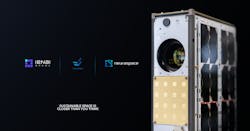Trio of European NewSpace companies demo orbital demonstration collision avoidance system
MADRID - Three European NewSpace companies have partnered for Europe’s first orbital demonstration of a collision avoidance system based on artificial intelligence (AI). Neuraspace in Coimbra, Portugal, Ienai Space in Madrid, and EnduroSat in Sofia, Bulgaria, The companies say their aim is to make space-traffic-management a reality.
Neuraspace is a Portuguese space traffic management company based in Coimbra, Ienai Space a Spanish in-space mobility company in Madrid, and EnduroSat is a Bulgarian satellite manufacturer, operator, and 99oturnkey provider of space-as-a-service (SPaaS) -Bulgaria's capital, Sofia.
The mission will serve as a precursor for an end-to-end space traffic management (STM) solution for increased spacecraft safety. The STM will provide spacecraft operators with better space traffic data, collision detection algorithms and more efficient propulsion systems.
Ienai and Neuraspace also signed a memorandum of understanding (MOU) to collaborate on tackling the growing issue of space debris through joint traffic management products. Both companies are looking to reduce the risk of collisions in space by lowering decision times for customers. They will provide operators with more effective decision-making and execution options for collision avoidance maneuvers for their spacecrafts.
In collaboration with EnduroSat, the companies plan to demonstrate their joint collision avoidance capabilities with a mission in 2023.
The satellite, built by EnduroSat, will be launched aboard an Isar Aerospace rocket (ISAR 2). Once in orbit, it will be maneuvered by Ienai’s ‘Athena’ thrusters. The thrusters will respond to both simulated and real collision warnings and maneuvering suggestions. The warnings and suggestions will be generated by Neuraspace’s AI/ML (machine learning) driven STM solution.
With this mission, EnduroSat also plans to further expand its sustainability capabilities. EnduroSat, and Neuraspace are both early adopters of the Space Sustainability Rating which encourages, recognises, and rewards, space actors who enforce sustainable space missions with a rating system.
